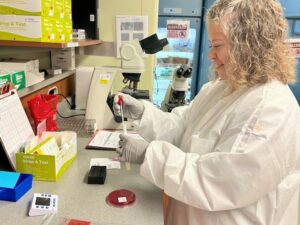
Jumper is one of two Louisiana State University of Alexandria, students completing the clinical phase of the associate of medical laboratory science programs at Bayne-Jones Army Community Hospital.
Story by Jean Graves
Bayne-Jones Army Community Hospital
FORT JOHNSON, La. —Bayne-Jones Army Community Hospital recently joined forces with Louisiana State University, Alexandria to serve as a clinical training site for their associate degree in medical laboratory science.
Jeff Langston, dean for the LSUA College of Health & Human Services, said he appreciates the opportunity to partner with BJACH.
“LSUA and Fort Johnson have a great partnership that has benefited the community in many ways,” he said. “This particular partnership with BJACH formed due to a need for a full-service laboratory to train our students.”
Langston said he hoped to expand training at BJACH to other clinical areas in the future.
“We have students driving from the Leesville area for our programs, so this was an ideal situation,” he said. “Everyone knows the healthcare workforce is experiencing shortages and it takes partnerships like this to make an impact.”
Lillyan Hyatt is one of two LSUA students training at BJACH. She decided she wanted to become a lab tech after analyzing her personal goals and professional priorities.
“I’m a detail-oriented and introverted person,” she said. “Working in the lab is so interesting and the science and technology are always changing. I know I will be constantly learning and never bored working in the lab.”
Hyatt said BJACH has been a great learning environment.
“Hands on learning is so different than reading a textbook,” she said. “The team here has been great. Not only are they fulfilling our academic training requirements, but they are also advising and sharing their experiences which has been immeasurably beneficial to me personally.”
Melissa Jumper, a non-traditional student, said direct patient care motivated her to pursue a medical laboratory science degree.
“I have bachelor’s degree in molecular biology and am a hemodialysis technician,” she said. “I chose to pursue this vocation because it’s a culmination of my clinical and laboratory research experiences. Working in a medical lab, I will be able to help patients right now, unlike my research which might help a patient in 20 years.”
Jumper, a Fort Johnson resident, said she is thankful for the ability to train at BJACH.
“Having this opportunity locally is so important to me, it means not having to commute two-hours a day to Alexandria,” she said. “The BJACH pathology department is one of 22 military treatment facilities that trains medical laboratory technicians for the Army, so they were prepared for us; they are already an academic environment. The team here has been wonderful.”
Pamela Freeman, supervisory medical technologist for microbiology and serology at BJACH, said training civilian university students in the lab has been refreshing.
“The program at LSUA has given them an excellent theoretical foundation,” she said. “Because these students have such a solid academic background, I don’t have to waste any time explaining or reviewing the basics, which has allowed me to get more in-depth with their training than I can with our advanced individual training students.”
Freeman said she is impressed with the program at LSUA.
“Working in the lab is so rewarding for me. The lab is an essential part of our hospital,” she said. “I get to help people and do science projects every day. I love what I do, and I am happy to help others pursuing this profession.”
Sona Kumar is the coordinator for the LSUA associate of medical laboratory science program.
“I am so excited about this agreement with BJACH,” she said. “This has been such a positive experience for our students.”
Kumar said this is an important field for students to pursue.
“If students love science, solving puzzles and want to help patients behind the scenes, this is a very satisfying career field,” she said. “The associate of medical laboratory science program we offer at LSUA is excellent and our students have a 100% employment rate upon graduation and certification.”
Kumar said in addition to the academic and clinical course work, students must successfully pass the American Society of Clinical Pathology board of certification examination.
Col. Alisa Wilma, hospital commander, said working with LSUA enhances relationships with the surrounding community in many ways.
“The more students we have who are interested in highly technical medical fields, who go into this program and others like it, the more options we have to staff our hospital,” she said. “When we provide training space for universities, it helps our network hospital partners as well, because we are all reliant on each other for the benefit of our shared patients and beneficiaries.”
Editor’s note: Medical Laboratory Professionals Week, April 14-20, 2024, to learn more about the LSUA medical laboratory science program visit: https://www.lsua.edu/academics/programs/associate-of-science—medical-laboratory-science